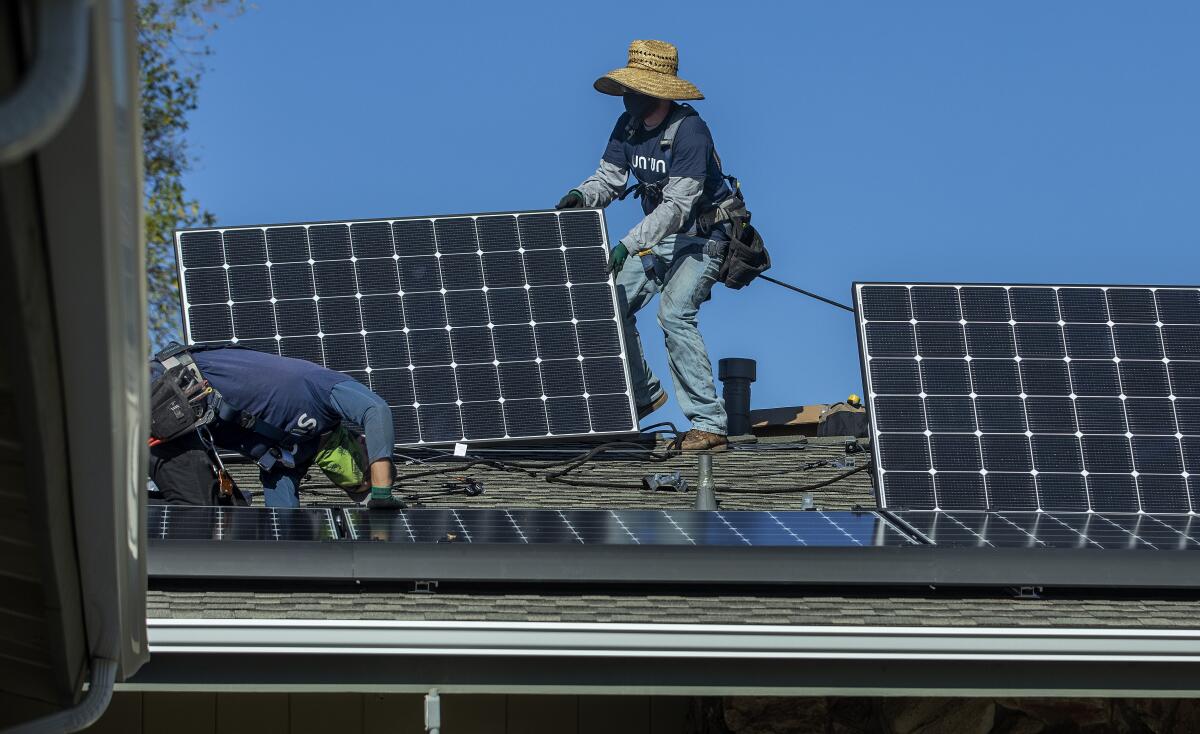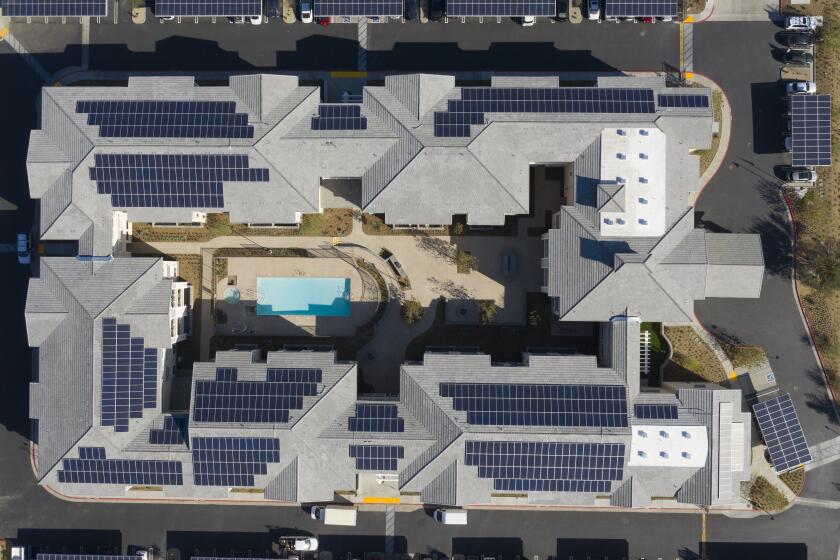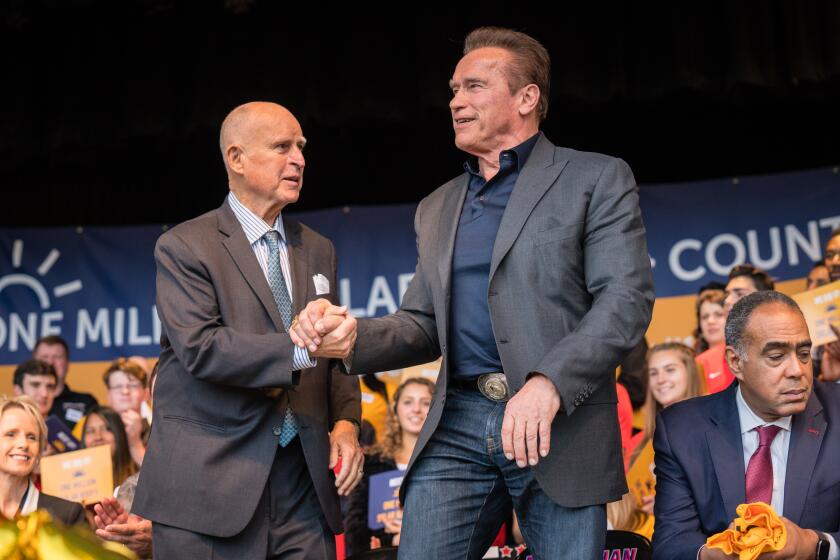There’s a battle brewing over changes to California solar incentives. Newsom is in the middle

- Share via
SACRAMENTO — Rooftop solar is generating intense heat on Gov. Gavin Newsom. And he’s quietly trying to cool it down.
He’s doing that by pressuring warring interest groups and the California Public Utilities Commission.
Governors and interests regularly pressure one another. It’s part of the political playbook.
But the PUC is officially an independent agency. And governors aren’t supposed to lean on the commissioners in their policymaking. Wink, wink.
Successful governors do, of course. They’d be negligent not to. They appoint all five members and name the president. Governors often get credit or blame for their appointees’ decisions.
Newsom recently appointed two new commissioners. One was his energy advisor, Alice Reynolds, whom he installed as president.
“I’ve never known a governor who didn’t have a tremendous influence on the PUC,” says Susan Kennedy, a former commissioner.
“I know every major decision I ever made, I was in constant communication with the governor’s office.”
Kennedy speaks from unusual experience. She was a top advisor to two governors of both parties, serving as Democrat Gray Davis’ Cabinet secretary and Republican Arnold Schwarzenegger’s chief of staff. Davis placed her on the commission, and Schwarzenegger named her his top aide after they developed a close working relationship at the PUC.
The hot issue now at the PUC is its proposal to drastically reduce subsidies for homeowners who spent thousands of dollars to install rooftop solar after being promised a generous price for the electricity they generated but didn’t use. That plus the fact they’d need to buy fewer kilowatts from an electricity utility made it a sweet long-term investment for those who could afford the installation.
Want to go solar, or already have rooftop panels? Here’s how proposed changes would affect you.
Governors — particularly Schwarzenegger — used these financial incentives to coax homeowners into creating their own solar electricity so they’d burn less fossil-fuel-generated energy that warmed the planet.
The strategy has been highly successful. There are more than 1.3 million rooftop solar installations in California, and this state leads the nation in clean energy.
But utilities say the incentives have become way too generous, and the PUC agrees. Utilities are forced to pay rooftop solar owners several times more for their unused electricity than it’s worth. The kilowatts can be bought a lot cheaper from big solar farms.
Moreover, people who own rooftop solar tend to be comfortable financially. Those who don’t generally have much lower incomes and are stuck paying for wealthy people’s subsidies through higher electricity rates.
The private utilities — Southern California Edison, Pacific Gas & Electric and San Diego Gas & Electric — are allowed by the PUC to earn a certain profit. If solar owners aren’t kicking in their fair share of the profit, non-solar customers get hit up. And that’s what’s happening, according to the PUC.
“Utilities don’t end up paying for the over-subsidies. Other customers do. And those people are poorer,” says Severin Borenstein, faculty director of the UC Energy Institute. “It’s adding to the rise in electricity prices.”
OK, but rooftop solar owners are angry. They accuse the state of reneging on a promise made years ago of a nifty deal for partially switching to green energy.
“This is a bait and switch,” says Jamie Court, a strategist for activist Consumer Watchdog.
Schwarzenegger, in an op-ed piece for the New York Times, declared that the PUC plan “should be stopped in its tracks.”
Clean energy activists and utility giants are duking it out over the future of rooftop solar.
U.S. Sen. Dianne Feinstein (D-Calif.) also has weighed in, writing the new PUC president that the plan “is concerning and may impact the state’s conservation goals as we address climate change.”
Especially grating for solar owners is a PUC plan to impose a monthly fee of around $50 for generating the green energy. The fee would help pay the utilities’ fixed costs, such as grid maintenance and wildfire mitigation. Ordinarily, a customer would pay that money when buying a utility’s electricity. But that’s being avoided by using home-generated solar energy.
The PUC calls it a “grid participation charge.”
“Let’s call it what it is: a solar tax,” Schwarzenegger writes.
“Everyone agrees [the subsidies] need to be reformed,” says Kennedy, who adds she isn’t involved in the fight. “How do you keep the solar industry going but not put in something politically stupid like a tax?”
Column: How California’s rooftop solar program became a victim of its own spectacular success
California’s rooftop solar program leads the nation, but now has to evolve.
Both sides are running TV ads trying to rile the public into shouting at the governor and the PUC.
“We’re trying to make him feel the heat and to understand that if he wants to be a climate change leader, he’s going to have to lead and not be put in a position where California has the worst rooftop solar policy in America,” Court says. “He’s got everybody on his butt.”
Newsom has urged both sides to get off their own butts and compromise. They’ve been lectured in his office by top aides.
One side includes the PUC, utilities, labor unions that install solar farm panels, and reformers. On the other side are rooftop solar owners and the companies that sell and install the panels, plus green energy advocates.
The PUC had scheduled a final decision for last week but delayed it — a sign the panel is trying to cut a deal.
Newsom is in a bind. He believes the subsidies are too generous and poor people are getting rooked. But he’s worried about being tagged as anti-solar.
The governor has said very little publicly.
“There’s a lot of work to do. Leave it at that,” he told reporters three weeks ago. “Many conversations. Lots of balls in the air.”
Surely Newsom can covertly maneuver the PUC toward a compromise that’s fair to solar owners, low-income ratepayers and the utilities, while expanding clean energy. And lower the temperature on himself.
More to Read
Sign up for Essential California
The most important California stories and recommendations in your inbox every morning.
You may occasionally receive promotional content from the Los Angeles Times.














